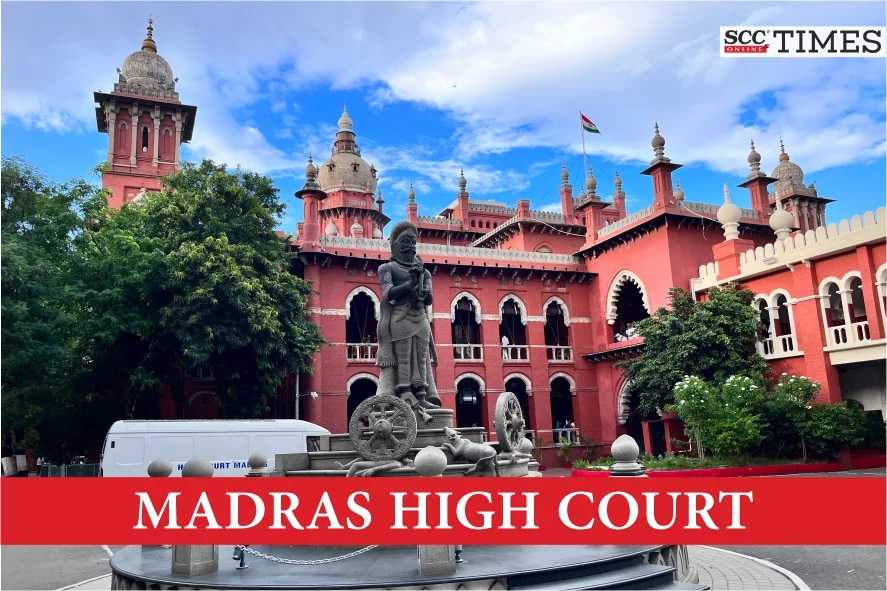Madras High Court: In a writ petition filed under Article 226 of the Constitution of India praying to direct the Managing Director and Administrative Officer of Tamil Nadu Housing Board to not insist the petitioner to produce the certificate of passing the Tamil Language Test in the light of the Government Order No.49 Human Resource Development Department dated 23-05-2022 and to grant pending increments and promotion, N. Anand Venkatesh, J. while exercising its extraordinary jurisdiction under Article 226 of the Constitution, the Court directed Board to grant exemption to the petitioner to clear the Tamil Language Test and to produce the certificate. Further, directed the Managing Director to pass a specific order in this regard, within a period of four weeks from the date of receipt of a copy of this order.
The Court also directed the Board to extend all attendant benefits to which the petitioner is entitled to, and to pass appropriate orders in this regard.
Background:
The petitioner was an individual who had been hearing and speech impaired since the age of three. Despite these challenges, the petitioner successfully pursued education in the English language, completing school with the support of Government Order (G.O.Ms.No.1893) dated 24-03-1982 which allowed children with hearing and speech impairments to study in any language of their choice. After completing school, the petitioner continued their education in the field of Civil Engineering, enrolling in the Bachelor of Engineering (B.E.) program. Thereafter, the petitioner participated in the selection to the post of Assistant Engineer conducted by the Housing Board, and he got selected and appointed in the year 2014 as Assistant Engineer.
The further case of the petitioner is that as per the relevant Government Order, the petitioner must produce the certificate for passing Tamil language test. The petitioner was expressing to the Board that considering the disability suffered by him, he must be exempted from this test. The Board was extending the time for completion of the Tamil language test and ultimately, through the letter, the petitioner was informed that he must complete the Tamil language test on or before 01-11-2023, failing which he will be discharged from service. Thus, the present writ petition was filed.
Issue:
Whether the petitioner must be granted exemption from passing the Tamil language test, which is mandatory under G.O.Ms.No.89 dated 09-07-1996?
Analysis and Decision:
The Court took note of the Government Order dated 24-03-1982, and observed that for persons like the petitioner, they are permitted to study in any one of the languages (i.e.,) either in Tamil or other languages. They are also permitted to appear in the examination either in Tamil language or other languages.
The Court remarked that, the petitioner, in spite of facing such disability, cleared his school studies and joined in the Engineering course. He completed Civil Engineering in the year 2003 and was appointed as Assistant Engineer by the Housing Board in the year 2014.
After perusing the Government Order dated 09-07-1996, the Court noted that the language test consists of a written examination and Viva Voce. Further, the petitioner had in fact participated in the written examination twice.
The Court remarked that considering the disability suffered by the petitioner, it is next to impossible to conduct a Viva-Voce. Hence, the petitioner has to be reasonably accommodated in the given circumstances by granting exemption to the petitioner from clearing the language test.
The Court noted that the Regulation Book of the Housing Board itself provides for granting exemption in deserving cases.
The Court proceeded to examine the Rights of Persons with Disabilities Act, 2016 and emphasized that the Act specifically addresses the right to reasonable accommodation for persons with disabilities.
After referring to Vikash Kumar v. Union Public Service Commission, (2021) 5 SCC 370, the Court observed that failure to provide reasonable accommodation to persons suffering from peculiar disability will result in a clear discrimination shown against them and which has to be rectified by a Constitutional Court.
The Court said that the barriers faced by persons with disabilities go beyond just physical accessibility issues, extending to deep rooted prejudice, stereo types and misconcepts that pervaded many aspects of society. From education and employment to health care and public services, persons with disabilities often face significant obstinance that hinders their full participation and inclusion.
In view of the same, the Court suggested that a Constitutional Court must develop an understanding of the Societal, Attitudinal, Cultural, Institutional, Structural, Legal and Environmental barriers that persons with disabilities encounter daily and must strive to remove these barriers through their rulings.
The Court said that the petitioner after a long struggle has entered the services of the Housing Board, and he has been working for the last 10 years. If he is now shown the door, he will be virtually left on the streets without any employment, considering the disability suffered by him. Therefore, the case in hand is one such deserving case where such exemption can be granted to the petitioner.
Thus, while exercising its extraordinary jurisdiction under Article 226 of the Constitution, the Court directed Board to grant exemption to the petitioner to clear the Tamil Language Test and to produce the certificate. Further, directed the Managing Director to pass a specific order in this regard, within a period of four weeks from the date of receipt of a copy of this order.
The Court also directed the Board to extend all attendant benefits to which the petitioner is entitled to, and to pass appropriate orders in this regard. Further, it mentioned that the attendant benefits have to be extended within a period of eight weeks from the date of receipt of a copy of this order.
[B. Vidyasagar v Government of Tamil Nadu, W.P.No.33673 of 2023, decided on 19-10-2024]
Advocates who appeared in this case :
For Petitioner: Mr.D.Muthukumar,
For Respondents: Mr.P.Balathandayutham, Special Government Pleader, Mr.V.Logesh , Standing Counsel , Mr.R.Bharanidharan, Standing Counsel







